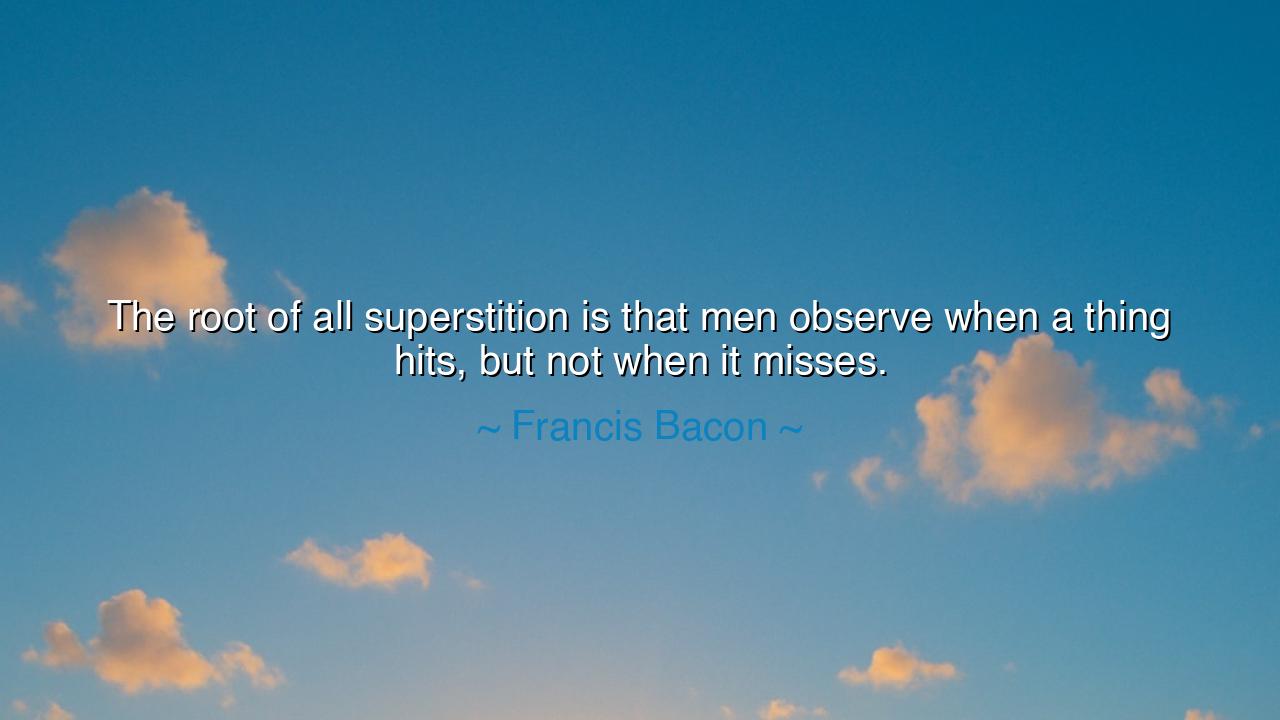
The root of all superstition is that men observe when a thing
The root of all superstition is that men observe when a thing hits, but not when it misses.






Hear the wisdom of Francis Bacon, philosopher of reason and father of modern science, who declared: “The root of all superstition is that men observe when a thing hits, but not when it misses.” This is no light utterance, but a torch lifted against the shadows of ignorance. For men, in their longing for certainty and meaning, are quick to seize upon the moments when their omens seem fulfilled, yet they close their eyes to the countless times when their signs and rituals fail. Thus superstition is born—not of truth, but of selective memory, not of wisdom, but of blindness to the whole.
The origin of this saying lies in the dawn of Bacon’s age, when Europe was awakening from centuries of dogma into the light of reason. The people believed in charms, in portents, in the alignment of stars, and they sought patterns in every accident of life. If a man wore a talisman and found fortune, he praised the charm; but if he wore it and misfortune struck, he dismissed it, refusing to see. Bacon, keen observer of nature, saw through this fog. He knew that superstition thrives because men look only at the hits—the rare occasions when their beliefs seem confirmed—while ignoring the misses that far outweigh them.
Consider the story of Julius Caesar and the soothsayer who warned him to beware the Ides of March. The tale has been remembered for centuries, for indeed, on that day, Caesar was slain. But how many other rulers, warned of omens that came to nothing, were forgotten? Men remember the one that “hits” and exalt it as proof, yet they forget the thousands of “misses” that reveal the emptiness of the sign. This is the way of superstition: it feeds on memory that is partial, not full, and on hope that clings to illusion more tightly than to truth.
Even in our own times, this pattern holds. How many look to horoscopes, claiming them true when a vague line seems to match their day, but ignoring all the other words that fail? How many gamblers recall the lucky charm that “worked” on their winning day, but forget the countless losses suffered while clinging to it? Bacon unmasks this error: the human heart is drawn to confirmation, and resists the pain of contradiction. But to seek truth, one must observe both when it strikes and when it fails. Only then can wisdom be separated from illusion.
This teaching is more than a rebuke of superstition—it is a call to a higher way of seeing. For life itself is filled with patterns, but not all patterns are true. The wise learn to discern the real from the imagined by counting not only the victories, but the defeats; not only the alignments, but the failures. Thus was born the scientific method, the discipline of observation, repetition, and evidence. Bacon, in pointing out the root of superstition, was pointing also to the root of truth: honest observation of all outcomes, not just the convenient ones.
The lesson for us is plain. In your own life, beware of the temptations of selective memory. Do not cling to beliefs simply because they comfort you when they “hit.” Examine also the times they fail. Question your assumptions, weigh your experiences, and refuse to build your life upon illusions. For superstition is easy, but truth is hard; superstition flatters, but truth refines; superstition binds, but truth sets free.
Therefore, O seeker, let Bacon’s words guide your steps. When fortune smiles, give thanks—but when fortune frowns, do not look away. Gather the whole picture, honor both success and failure, and let reason, not superstition, be your compass. In doing so, you will not be tossed about by every shadow of fear or promise of charm, but will stand firm upon the rock of truth. And truth, though stern, will prove the surest guide through the storms of life.






AAdministratorAdministrator
Welcome, honored guests. Please leave a comment, we will respond soon